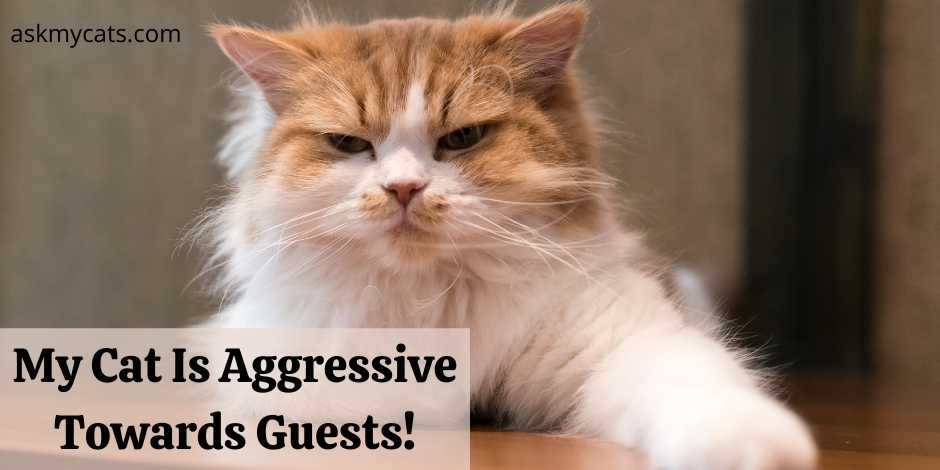Many cats feel uneasy with strangers, or even specific strangers in their own house. They are strangers to your cat, even if they are your visitors and friends. Aggression in cats is a major behavioral disorder that is an indication of a deeper issue.
Stranger aggression may be found in cats of any breed, size, age, or gender, and it can be motivated by a variety of factors. Understanding why cats respond aggressively is critical for avoiding damage.
Cats may be afraid of strangers or guests for various reasons, including a lack of familiarity with visitors as kittens. If cats are not socialized with a variety of individuals throughout their socialization stage (three to nine weeks of age), they may grow up to be fearful of strangers.
Now let’s discuss all the factors behind this aggressive behavior.


Give Your Cat the Perfect Day
Get the Free Ebook!
Why Does My Cat Hate Guests?
Your cat hates guests and surprise visits because they are not used to with this event since their childhood and it is a new thing to them.

Furthermore, the advent of visitors is frequently accompanied by additional frightening events such as knocking, moving huge items or bags, and loud chatting and laughing.
Some cats, like people, have more shy or less sociable dispositions or temperaments. According to studies, kittens born to anxious fathers are generally fearful as well.
First, if your cat’s worried behavior is new, get him examined by a veterinarian to rule out a medical reason.
To begin, make sure your cat has somewhere secured to go before the visitors come. The secure space should be somewhere out of the way, such as a rear room, where the sound of knocking or the doorbell will be muted.
Your cat does not have to interact with your visitors in the protected area, so she may feel peaceful and relaxed there. Depending on the length of their stay, the room should be set up with a comfy resting spot, water, and a litter box before they come.
Allow your cat to retire to the safe room if she wishes a few minutes before guests come.
To distract her and develop good associations with strangers in the house, give her a special food reward and an interactive or food-dispensing toy once she’s inside.
Then, to assist your cat feel more comfortable with visitors, you’ll need to go through a number of behavior modification procedures. You’ll need the assistance of a buddy to play the role of the stranger coming to visit, in addition to food, toys, or other prizes for your cat.
The basic concept is that the “stranger” will keep a safe distance from your cat, and your cat will be rewarded for being quiet in the company of the stranger.
You’ll progressively reduce the space between them over several sessions until your cat is entirely comfortable sitting next to the stranger.
My Cat Hides When We Have Visitors
Your cat hides when visitors come because they do not want to socialize.
Keep in mind that behavior adjustment takes time, and results may be slow at first. In certain situations, a cat’s comfort level will be reached; therefore we must be careful not to pressurize cats into accepting things they are unable to adjust to mentally.
This implies that some cats, for example, will never be comfortable being picked up by a stranger, so don’t feel obligated to allow people to connect physically with your cat.
Why Does My Cat Hiss And Growl At Guests?
Your cat hisses and growls at guests because they haven’t seen them before.

Fear is the leading cause of violence, and problems with handling are fairly prevalent. Picking up a cat is a natural aversion for many cats. They don’t enjoy it when their bodies are handled or manipulated in specific locations or ways.
If cats aren’t educated to accept and love touching from a young age, they may scratch, hiss, or bite in this situation. Giving your cat time to approach the stranger is always preferable to reaching out and petting a terrified cat, especially when they are hiding.
If you see dilated pupils, turned-back ears, or twitching or waving tail, leave the cat alone. These are symptoms of an overstimulated cat. If you disregard these cues, your cat may start growling, starching, or even biting you.
It may appear to be fun in certain instances. However, if your cat is overstimulated, it may soon become aggressive, biting and scratching you. If not treated appropriately, even minor kinds of hostility might develop into significant aggression.
Working with a professional who can examine the circumstances in which it occurs is a good idea. Never utilize a punishment tactic since it typically exacerbates aggressiveness.
Keep an eye out for changes in body language that indicate your cat is becoming scared or fearful. Your cat’s ears will turn back, eyes will dilate, the tail will be low or tucked between legs, and body posture will be low, as if ready to run and hide. Always provide a route out to a secure hiding spot for your cat, and never reach out to a terrified aggressive cat.
Cats that attack strangers are not only unsatisfied but also dangerous. Your first priority should be to keep everyone safe. It’s also critical that your cat’s conduct does not deteriorate while you’re teaching him the benefits of nonviolence. Fear and territorial aggressiveness are the two main reasons why cats are unpleasant to guests.
How Do I Stop My Cat Hissing At Guests?
You can stop your cat hissing at guests by offering him treats if they socialize with guests.
Reward your cat’s calm and non-anxious behavior with food, play, petting, and attention if she continues calm and non-anxious. Carry on in this manner for a few minutes, enabling your cat to quit the session whenever she wants.
If your cat wanders away, you can coax her back by opening or crinkling a reward pouch or cracking open a can of food. It’s fine if she’d rather terminate things after only one session. If you can persuade her to return, you can have numerous brief sessions throughout the stranger’s visit.
If your cat becomes agitated, gradually increase the space between her and the visitor until she no longer feels threatened. Reward her for her calm conduct at this distance, and then terminate the session.
Start at a distance she felt comfortable with in the last session during the next session. Start over at the farthest distance the room permits if the following session is with a different stranger.
Why Does My Cat Get Aggressive With Guests?
Your cat is becoming aggressive with guests because they are scared of them and their behavior.
It’s possible that frightened cats have had a bad encounters with strangers.
They’ll go to any length to avoid a conflict. They strike out if hissing, snarling, and fleeing doesn’t work.
If your kitten is pushed too hard, your attempts to aid will fail miserably.
How Can I Make My Cat Comfortable With Guests?
You can make your cat comfortable with guests by gradually calling guests at home often.

You may repeat the routines with many people at a time or add the element of mobility once your cat feels comfortable eating or playing near a new human. To include movement go back to step one and choose a starting distance where your cat is calm or distracted by toys or goodies.
Instead of telling the stranger to remain immobile, ask him to pace back and forth or make any other form of movement. A moving stranger’s beginning distance may differ from a stationary stranger’s. Other actions like getting up from a seated posture can be desensitized in the same way.
Your cat should become more acclimated to the harmless presence of the stranger after a few sessions. Reduce the distance between your cat and each new person by a few inches next.
This may be accomplished by simply moving your cat’s food dish closer to the stranger, tempting your cat closer with a treat or toy, or just asking the stranger to move a few inches closer to the cat.
Always keep an eye out for early indications of anxiousness in your cat. Reduce the distance between her and the stranger gradually and steadily over several sessions if she stays calm. Return to a distance away from the stranger where she is relaxed if she becomes anxious.
Must Read: Why Is My Pregnant Cat So Mean And Aggressive?
Frequently Asked Questions
How do I stop my cat from attacking guests?
Fear-based, territorial, petting-induced, and/or play-related stranger-directed aggressiveness are common. If the cat is truly terrified, hostility may be directed at the owner or other household pets. Even with minimum effort, though, progress is highly likely.
Why is my cat mean to guests?
Kittens that are kept away from humans and do not have early exposure may develop a problem tolerating strangers later in life. Additionally, cats’ previous interactions with humans will have an impact – positive interactions make cats think people are kind, whereas negative interactions make cats fearful of new people.
Why does my cat hiss and growl at everyone but me?
New objects in their environment might make cats feel threatened. They may hiss aggressively when they are afraid of strangers, other pets, or things. Whether your cat is scared of you, another pet, or a human visitor in your house.
Final Words
Cats have a reputation for being fussy about whom they spend their time with. It may appear unfair, but bonding with humans is about more than just satisfying basic requirements for your cat. They’re self-sufficient creatures who don’t necessarily require human care.
Leave your questions in the comments section below.
